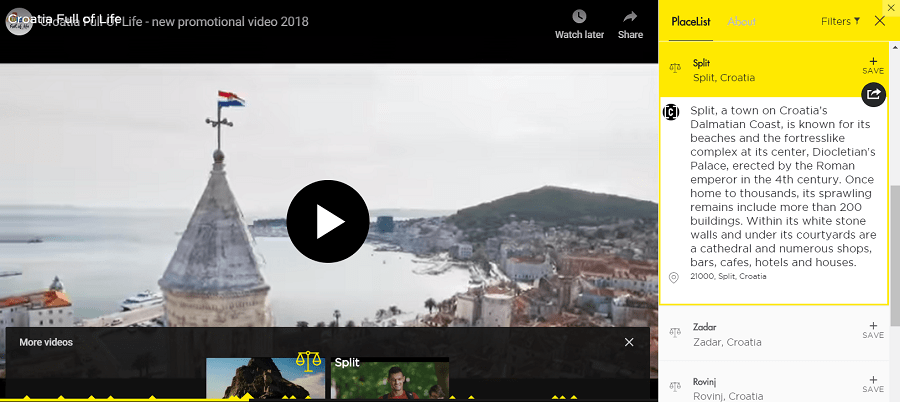Croatian Language: Phrase it Properly
July 24, 2020 - Ever wondered what some famous Croatian phrases really mean? TCN contributor Ivor Kruljac breaks it down.
Croatian – that Russian sounding language, which isn't Russian. It is exotic and mysterious with only, give or take, around five million native speakers (plus Serbian and Bosnian speakers who can easily understand it). Apparently, it's a hard and challenging language to learn for non-Slavic native speakers, but with enough motivation and hard work, you can certainly learn more than 'dobar dan' (good day), 'hvala' (thank you) and 'doviđenja' (goodbye). Fascinating for its rich and diverse vocabulary (foul language in particular), one of the most interesting things about Croatian, as in any other language, is the phrases speakers use to paint a certain situation or express thoughts. Some are very similar or even the same as in English, but some are completely different ways to say the same thought.
Here are 12 phrases to enhance your enthusiasm to dig deeper into Croatian.
1.) Kad na vrbi rodi grožđe / When willow gives you grapes
The phrase 'When willow gives you grapes', which is the equivalent to ‘When hell freezes over’, is a suitable phrase to say that something will never happen. Although this phrase will maybe need some alteration once genetic engineering catches its full speed.
2.) Mačji kašalj / Cat's cough
The easiness of 'eating cake' has been replaced with what used to be a typical pet for farmers and today for those who don't prefer dogs - a cat. 'Cat's cough' means that something is really easy to do, so simple and harmless that you, in fact, don't even notice it, and it can also be used to describe something as irrelevant. Might sound a bit odd, but think about it, did you ever hear a cat cough?
3.) Pijan kao majka / Drunk as a mother
Translating to 'Drunk as a mother', this saying might suggest that Croatians are getting raised with a lot of family issues. However, the phrase comes from the past when hospitals were non-existent and home births were a regular practice. To ease the pain of childbirth, the mother would be provided with the only anesthetic people could find in their household: alcohol. Pending on the pain and the duration of labour, the new mother could be completely hammered by the time she gets to hold her baby in her arms. A bit less fun than for fiddlers who were enjoying alcohol in between their performance, but the end result is pretty much the same: a hard time recollecting last night.
4.) Pušiš kao turčin / You smoke like a Turk
Croatian memory didn't register that much smoke coming from the chimneys, but they do remember Turkish soldiers during the conquering spree of the Ottoman Empire. Noted as passionate smokers, even today people in Croatia would often say to you that you 'Smoke like a Turk', if you light your fifth cigarette before you even put sugar in your morning coffee.
5.) Mi o vuku, vuk na vrata / Speak of the wolf, wolf at the doors
Basically, 'Speak of the devil' only replace the king of hell with the wolf that is in front of your door just as you were talking about him. Scary not only because of his fatality for humans, the wolf was also hated among Croatian villagers for slaughtering sheep and other farm animals.
6.) Ispeci pa reci / Bake it and then say it
This is similar to 'Think before you speak' with some differences. With the translation being 'Bake it and then say it', it is a suitable response to everyone bragging about something while not having any proof they did it or are telling you how to do something even though they are not doing it.
7.) Trinaesto prase / 13th pig
The unlucky 'Thirteenth pig' is truly a clever deduction. To attribute someone who always got left behind, people compared him with a rare but very possible scenario when a pig gives birth to 13 piglets. With only 12 breasts for feeding, one always loses a meal.
8.) Točan kao švicarski sat / Precise as a Swiss watch
With its Rolex and Tag Heuer, Switzerland is a known symbol of quality and precision when it comes to wristwatches. Especially for Croatians. The older generations would often say to you that you are 'precise as a Swiss watch' when you arrive on time.
9.) U tom grmu leži zec / In this bush lies the rabbit
Not just an observation in hunting, 'in this bush lies the rabbit' is a common phrase to describe a situation when someone keeps a secret from you, or reveals his/her secret motives that explain something you couldn't quite put your finger on.
10.) Pamti pa vrati / Remember and return
'Remember and return' at first may sound a bit revengeful, and it is. But it can also mean to return a nice favour to someone. Basically, how you treat others, others will treat you. If someone was nice to you, remember that and be nice as well and if not, remember, so you don't make the same mistake twice.
11.) Bez muke nema nauke / Without suffering there is no knowledge
The Croatian version that's most similar to 'No pain, no gain' translates as 'Without suffering, there is no knowledge'. Guess it was easier for Croatians to learn from their own mistakes and not from others.
12.) Što se praviš Englezom? / Why are you pretending you are English?
In the past, Croatian territory was under the rule of the Romans, Austrians, Hungarians, Turks, French and even had close clashes with Tatars during Genghis Khan. The colonial force of the British empire does not go further in Croatia than Vis island, where in the 19th century, the Brits raised fortresses seeable today as you enter St. Juraj port. Despite that, English folks entered Croatian phrasing nevertheless. 'Why are you pretending you are English?' is a question for someone who had done something wrong but acted like he/she didn't do anything and didn't know what you are talking about. It can also be used to describe someone who acts more important than he/she really is, which might have been inspired by the aristocracy or even the Royal family itself. Good news for Britain, however, is that this phrase is less used among younger generations (which can also, let's be frank, be said for all of these phrases). Still, don't be surprised if you meet a cute and wisecracking Croatian group that might remember this and use it as a suitable joke for their English friends.
Croatian Zoran Milanović First Former Prime Minister Elected President
Although only 53 years old, Croatian President-elect Zoran Milanović is already a political veteran. Since Croatia's independence, he is the only politician to be elected to two of the most important state functions, first as prime minister and now president.
He was born on October 30, 1966 in Zagreb. In private conversations, he likes to point out that Zagreb shaped his identity, but was also intrigued by his family history, according to Robert Bajruš/Jutarnji List on January 6, 2020. Therefore, Milanović researched archives from Austrian barracks and the Sinj monastery in a quest for information on his ancestors and their life paths. Zoran Milanović's family is from western Bosnia and arrived in the Sinj region as part of a mass migration led by Franciscan Friars in 1687. His mother Đurđica Matasić's family has lived in Sinj for almost two centuries.
Father Held Key Zagreb Government Positions
His father, Stipe Milanović, performed several important roles during the socialist regime: he was Cabinet Secretary to Miko Tripalo, a Zagreb city council member and chaired the Vatroslav Lisinski Hall Construction Committee. In the early 1990s, he joined HDZ (Croatian Democratic Union) and became Assistant Minister to Vlatko Pavletić.
Milanović's claim that his grandfather was an Ustasha member (Croatian WWII Fascists) was one of the more interesting developments in the 2016 election campaign. He was referring to his mother Đurđica’s stepfather, Petar Plišić, but had kept silent about him until then.
He graduated from the Faculty of Law in Zagreb in the early 1990s where he was an excellent student. He received the Rector's Award and participated in the "Telders" competition in public international law at The Hague.
Began Post Law School Career in Foreign Diplomacy
Milanović landed his first job at the Commercial Court in Zagreb and then the Ministry of Foreign Affairs in 1993, where he arrived upon the recommendation of Ivan Šimonović, professor at the Faculty of Law and Permanent Representative of the Republic of Croatia to the UN. He became advisor to the Croatian Mission to the European Union and NATO in Brussels in 1996 and completed a postgraduate certificate in European Union law there two years later.
He joined SDP (Social Democratic Party of Croatia) immediately after his return to Zagreb in 1999. After SDP won the January 3, 2000 elections as part of a coalition, he was entrusted with a position in communications with NATO. Three years later, he was appointed Assistant Minister of Foreign Affairs under Tonino Picula. However, he left diplomacy and was brought onto the SDP Executive Board at the invitation of Ivica Račan after the HDZ won the 2003 elections.
Assumed SDP Leadership Role After Račan
The SDP party membership overwhelmingly chose Milanović as their new leader when Ivica Račan died in 2007. He had defeated Željko Antunović, Milan Bandić and Tonino Picula; the party’s old guard. While Račan had not considered him his successor; within a month Milanović had taken control of SDP and set about overthrowing Ivo Sanader.
Diana Pleština, widow of the former SDP leader, spoke about the Račan-Milanović relationship. While she has always thought well of Milanović; she also noted:
"Ivica Račan understood that Milanović was young and well-educated, and had experience communicating with the outside world, but he was not referring to Zoran Milanović in the phrase 'New SDP Force'. Instead he was referring to Milanović along with other members of the party. Therefore, the ‘New SDP force’ was not referring to one person, but an overall proposal to continue the rejuvenation of the Social Democratic Party, and one of those players was Milanović,” Dijana Pleština recalled.
However, he lost to Ivo Sanader in the 2007 parliamentary elections and spent the next four years leading the opposition. During that time, he was able to marginalize the old guard within SDP and surround himself with a new generation of associates including Ranko Ostojić, Siniša Hajdaš Dončić, Rajko Ostojić, Ante Kotromanović, Igor Dragovan and Gordan Maras.
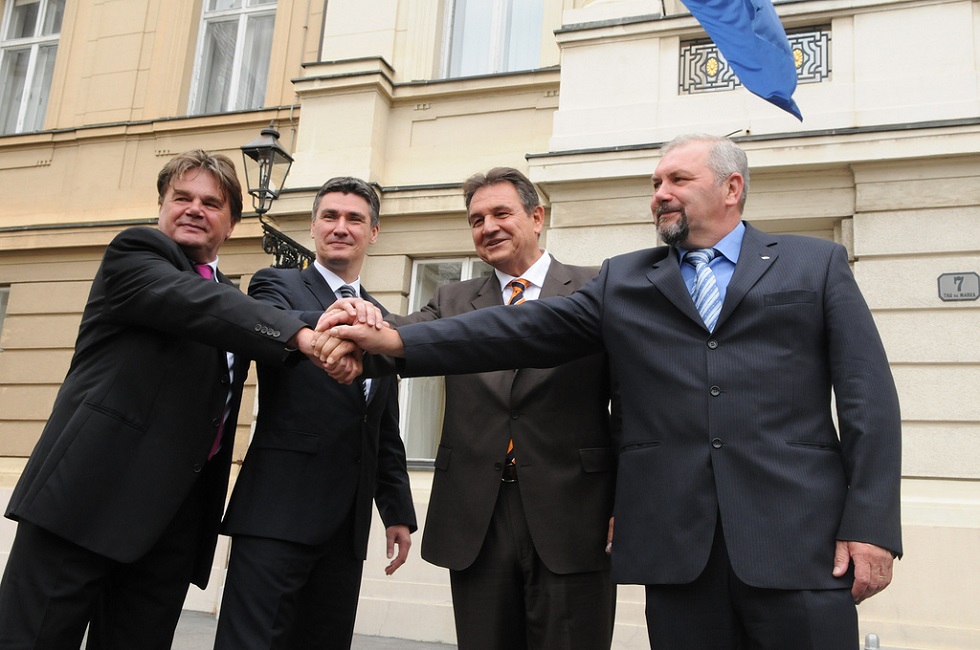
Defeated Scandal Ridden HDZ With Kukuriku Coalition
In November 2011, under Milanović’s leadership, the SDP-HNS-IDS-HSU coalition overwhelmingly defeated HDZ, which had been rocked by a series of corruption scandals. Their coalition ruled Croatia for the next four years. Before that victory, Milanović played a crucial role in the election of SDP presidential candidate Ivo Josipović. Josipović's victory had a strategic effect on the downfall of HDZ and Prime Minister Jadranka Kosor, and subsequent victory of the four-party coalition.
Milanović's political experience did not often reveal itself during his first three years in office. In the face of poor economic performance, he was subject to widespread criticism for refusing to make severe cuts to a bloated and inefficient state administration, which was stifling the economy. In addition, almost nobody believed he could make a comeback after he barely succeeded in expelling Slavko Linić from SDP in June 2014. Those doubts were strengthened after Kolinda Grabar-Kitarović narrowly defeated Ivo Josipović in the 2015 presidential election.
"Who would have thought that we were capable of regaining voter confidence back in January," Milanović recently suggested in a private interview.
Political Personal Evolution and Move to Right
Nevertheless, he changed tremendously and became much more accessible while choosing to remain silent about the confrontation with Linić. Even then, a well-known SDP politician revealed that he had been closely observing Milanović's career for seven years, and denied the widespread belief that the SDP chief was incapable of transforming himself:
"After losing the election to Ivo Sanader in 2007, Milanović realized that he had to change. He succeeded because he strengthened the party with new young talent. I’ve also changed and have begun displaying a better part of my character in interactions with people. That’s why I believe he can also change in a positive way,” claimed this member of government.
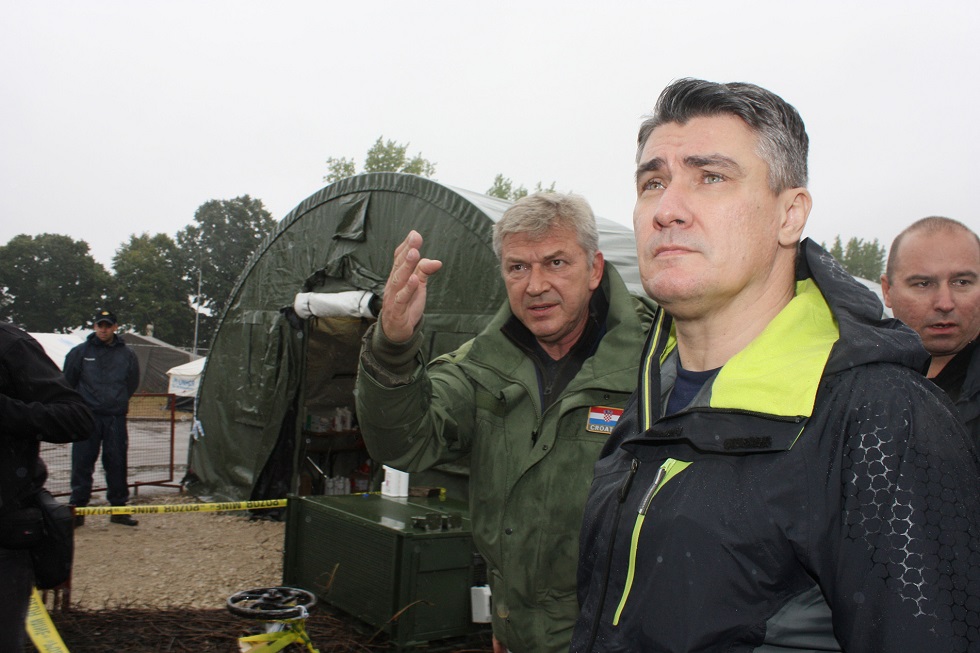
Praise for Franjo Tuđman and Croatian Nation in Knin
After all, Milanović's metamorphosis, which manifested itself in a slight turn to the right, was first noticed in Knin on August 5, 2014 when he gave a speech commemorating Dan domovinske zahvalnosti (Homeland Thanksgiving Day), which suggested a more patriotic direction. It was then that he first came forward with the conviction that his government was a people's government elected by the Croatian nation, comprised of people who are of primarily Croatian background. "As long is that is the case, we will oversee this country and lead it on the right path with Croatian interests in mind," Milanović said.
Milanović also paid respect to the first Croatian president, Franjo Tuđman, "because he was the Croatian president during a most difficult and challenging time."
“We have been waiting for a thousand years to have our own state and are grateful to those who gave everything for our country. For thousands of years we have worked, fought and died for foreigners, who treated us like foreigners, but they are not our enemies today. We are united with them in the EU and are building a better future together,” said Milanović in Knin.
It was the beginning of a 16-month campaign in which Zoran Milanović decided to tackle the stigma of (Croatian) leftists and present himself as a self-aware national leader. A social democrat who respects Tuđman, frequently mentions Croatia and condemns chauvinism then became his election-winning formula.
He also hired PR expert Alex Braun and his government achieved positive economic results in 2015. However, Milanović narrowly lost the parliamentary elections, remained at the helm of the SDP and defeated his old rival, Zlatko Komadin, in party elections.
Withdrawal from Politics After 2016 Defeat
After the fall of Prime Minister Tim Orešković’s short-lived administration in late 2016, Milanović led the People's Coalition into the elections, but lost, and then announced that he was withdrawing from politics.
In November 2016, he founded EuroAlba Advisory. Earlier this year, the media reported that the company's total 2018 revenue was 744,970 HRK (99,700 EUR), about a 20 percent increase from a 2017 reported revenue of 625,000 HRK (83,600 EUR).
Milanović lost his father Stipe and his younger brother Krešimir, who died after a short illness, during his election campaign late last year.
Follow our Politics page to stay updated on the new Croatian presidency and upcoming 2020 parliamentary elections.
Croatian Companies Face Strong Competition and Require Innovation
Croatia's EU presidency during the first half of 2020 will be a great opportunity for our country, its promotion and the Croatian economy. Luka Burilović, President of the Croatian Chamber of Commerce (CCC), spoke with Novac/Adriano Milovan about the Croatian Presidency and about the challenges it faces within the new financial framework of the union and the use of EU funds. These topics were also the focus of today's conference titled: "Invest EU: Investment Incentives and Expectations for the Croatian EU Presidency", which was co-organized by Hanza Media at the Esplanade Hotel in Zagreb, where Burilović was a participant.
Croatia will soon assume the EU presidency. How do you evaluate the goals of the Presidency presented by Zagreb officials?
- The priorities of "Developing Europe" and "Connecting Europe" have distinct economic dimensions. With this we are sending a powerful message that economic growth and sustainable development are at the top of the list of national and European priorities in the upcoming period. These goals are achievable and, if realized, we can strengthen our position as a serious and successful partner in the international environment.
How do you view the Union enlargement process? After Croatia's accession to the EU, it appears that further enlargement is “on ice”, which can also be seen by the EU's decision not to open accession negotiations with Albania and Northern Macedonia. How should Croatia be positioned towards EU enlargements in Southeastern Europe and what could it contribute to the Croatian economy?
- EU enlargement is a politically, economically and security relevant topic. It is of importance to Croatia because this is a neighborhood with which we have certain unresolved issues, but also strong economic ties. The region has traditionally been an essential market for our businesses. It is our interest to continue the enlargement process, but it is not possible to predict accurately when, to what extent and with what dynamics this will occur. The fact remains that our "neighbors" are bound by long-term economic interests, regardless of whether they are EU members.
How is the Croatian Chamber of Commerce welcoming the Croatian Presidency of the European Union? What will it mean for the Chamber?
- Of course, the chairmanship is an opportunity to give the CCC events which it normally organizes even more meaning and resonance. An economic forum with significant players involved, regarding statesmen, institutions and companies, would certainly be a greater opportunity for cooperation. But it's secondary. It is much more important to see how we can influence policies. Our sectors analyze the needs of members to see how we can better promote our interests at the right moment. The question of all questions is, of course, budgeting. We have the potential to establish a better beginning position for our economy.
In Croatia, much has been said in recent years about fostering innovation. You recently pointed out that Croatia is a country with a long tradition of innovation which continues today. Nevertheless, the fact is that by spending less than one percent of the GDP on research and development, Croatia is at the very bottom of the EU and far from the EU average and proclaimed targets?
- A combination of factors is needed to change the situation. We begin from a situation that drives us to be creative, innovative and different from others in order to survive. We need a higher-quality scientific research community. We need a clear strategy and a stimulating financial framework for investment in research, development and innovation. Ultimately comes the part of the story with the highlights. We need to have resources available for investment and research and development.
In your opinion, what are Croatia's biggest innovations? What can we offer Europe and the world?
- As a small and open economy, Croatia is exposed to strong competitive pressures from the global market. For businesses to survive, they are compelled to find new and more effective solutions. Innovation is a necessity for us. Some of the advantages are having a quality academic staff in the faculties of technical and natural sciences and a strong IT sector, which is a prerequisite for development in today's digital age. The substantial amounts available from the EU research and development funds, which will continue to be available in the new financial framework, should not be neglected.
How do you evaluate the use of EU funds in Croatia so far? The government has boasted that major steps have been made here, but the European Commission figures show that we are still at the very bottom of EU rankings. Why is that so?
- The current value of the disbursed funds is at 28 percent, but we should bear in mind that funds from the existing financial reserves will be disbursed until the end of 2023, and I am optimistic about this realization. We know from the experience of entrepreneurs that they are plagued by inadequate competition and lack of information. They are also discouraged by the complicated procedures and duration of the evaluation process.
In which segments should we strengthen the use of union funds to make them an engine for economic development? And how do we reduce the portion that we must put back into the EU budget, which is about 10 percent of the withdrawn funds?
- These funds are not or should be a major impulse to stimulate significant economic growth. When it comes to areas requiring additional funding, it is about making a major investment in research and development with the goal of bringing as many innovations as possible to the EU to compete globally with countries such as the US and China.
Shortcomings in establishing procedures as well as in the implementation of those procedures have already been identified during the use of EU funds. Consideration should be given regarding how to make the process easier for applicants and users of funds.
What are the chances of Croatia establishing a new EU financial framework for 2027? As it stands now, less money will be allocated to us than within our current financial framework?
- Of course, within the framework of EU policies, Croatia sets its own priorities, i.e. the sectors and areas for which we will be able to spend EU funds. Therefore, the financial framework depends primarily on how we plan for the next financial period. The solution is to adopt the Croatian Development Strategy as soon as possible and propose operational programs based upon it. There is no doubt within the CCC, that the ecosystem for the development of entrepreneurship, innovation and exports must be at the top of our priorities.
Although Croatia has, cumulatively, attracted large foreign investments since independence, we still chronically lack greenfield investments, which would create jobs and stimulate exports. What should be done in this regard?
- Creating a stimulating investment environment is a process from the ground up. It requires a solid macroeconomic framework, tax policy, various targeted sectoral incentives and the availability of a quality workforce. It also requires a tailored education system for industry development, a dependable legislative framework, a geostrategic position, and transport connectivity...
It is imperative to open the door to new investments with high-value products, by making investments in research and development and the creation of products for export. Croatia is not an investment destination for cheap labor, nor should it be. We should target investors who will raise the standard of workforce that Croatian professionals already enjoy abroad, so that we could also achieve it in Croatia.
More information about Invest EU can be found here. And information about the Croatian Chamber of Commerce can be found here.
Please follow our business section for updates and developments in Croatia.
Croatian Promo Video Showcases New Video Info Tagging Software
November 24, 2018 - Move over Facebook tagging, video tagging has arrived, taking tourist info to the next level, as was demonstrated at last month's Days of Croatian Tourism on Hvar.
So many great Croatian conferences in recent weeks, so little time.
Among the many thought-provoking presentations at last month's Days of Croatian Tourism conference on Hvar last month was a presentation by Philip DeBevoise, the CEO of Citizine Networks, a Los Angeles-based media company. Citizine was the initiator of the inaugural Travel Video Awards, which was this year won by the Croatian National Tourist Board for their promotional video featuring the country's World Cup stars. Released in November 20187, the video was perfect marketing material after Croatia's unexpected success in Russia in July.
While DeBevoise was talking about the travel awards, he also had some rather interesting video-tagging software to present, which is currently being developed by Citizine. Video search is becoming increasingly important in tourist holiday planning, and while many promotional videos show images of outstanding beauty, it is often hard for viewers to recognise the locations, never mind find out more details, without pausing the video and doing some research.
Using the example of the award-winning Croatian video, DeBevoise showed just a fraction of the potential of the new technology. The video was tagged by location, so that the viewer has the option to learn more about the destination via an information sidebar offering immediate information, or the option to save the moment and return to it at the end of the video.
DeBevoise took the concept further, showing many more commercial opportunities, with another video featuring a cafe and a hotel. The tagging options in both offered the option of clicking through to the cafe and hotel websites, as well as the chance to make a reservation. As a marketing tool for tourism businesses, the potential clear, as is the ability to bring would-be tourists instantly closer to the destinations they are interested in. The technology is still in its infancy and being developed, but this should make a significant step in improving the access of tourism (and other) information.
I can't embed the video with all the tags, but you can watch it here (or a tag-free version below). The potential of this software for tourism promotion in enticing indeed.
To follow the latest in Croatian tourism, follow the dedicated TCN section.
Sretna Nova Godina! And the 5 Essential New Year's Eve Questions
Mihaela Šego takes us through five crucial questions on New Year’s Eve.
Sites in Split: Marmontova
Marmontova (Marmont’s Street) is today a popular pedestrian street leading north from Riva towards Trg Gaje Bulata, which is where the Croatian National Theatre is located. Other than housing glitzy shops, Marmontova bears historical significance too.
When Napoleon conquered Dalmatia in the early 19th century, his supervising General Auguste Marmont looked over infrastructural developments in Split. Marmont urbanized the city by bringing electricity to Split for the first time, tearing down unnecessary structures, and creating a more viable street grid. In honor of these improvements, the city has immortalized Marmont’s name by calling one of its most visited streets after him.
Along Marmontova you will find “Alliance Francaise,” a French culture and language center suitably located on a street named after a Frenchman. Previously, this location was a library and reading room founded in 1922.
Along the street is Split’s oldest pharmacy, “Varoš” from 1856, which is fitted with furniture from an even older Italian pharmacy. Wooden cabinets are from the time of the Renaissance and various neo- Renaissance decorations and figurines, notably Galen (the Greek physician) and Aesculapius (the God of doctors in Roman mythology) are still found in the space today; a cute little stop for medical dorks.
For the artsy crowd, there is an ever-changing photography exhibition at Galerija Fotoklub Split housed in a beautiful Secession style palace “Duplančić”, and another little gallery on the street often displays quirky art by local artists. Just off Marmontova is Split oldest cinema, Karaman, from 1907.
Most popular is the Fish Market (Ribarnica, or Peškarija in dialect), known as the “belly button of Marmontova” and a monument of the city where locals come early to buy the best the Adriatic has to offer. It is housed in a Secession style building with ironworks and white stone slabs displaying the freshest catch. As the city has grown, so has the market, now taking up some outdoor space as well. Visitors will be surprised to notice that the market is not bothered by flies; this is due to the smell of the nearby sulfur springs.
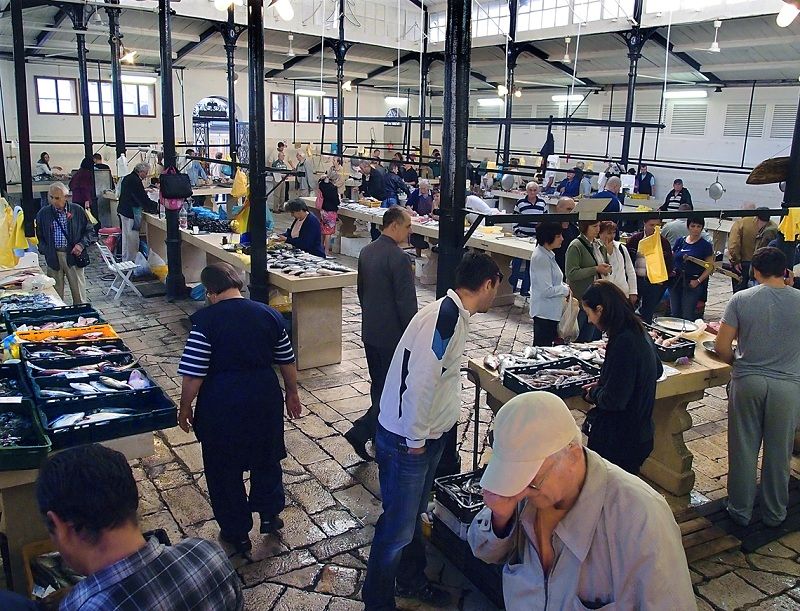
Along the street is the public Split Spa facility housed in a great Art Nouveau building by local architect Kamilo Tončić, recognized by its captivating sculptures of topless women on its façade.
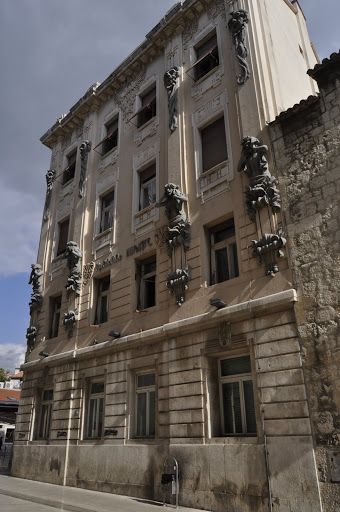
Curiosity will catch your eye as you spot the peculiar Pirja Fountain, a funnel-like sculpture on the ground and a fisted hand on the wall above where water aims into the funnel. The fisted hand shows the thumb protruding between the index finger and middle finger, showcasing a typical hand sign from Split, šipak, with a versatile definition of up yours, whatever, or nothing. Unfortunately, the fountain has not been in use much as the water splashes onto pedestrians. Ironically, the šipak faces directly to Zagreb; a coincidence perhaps?
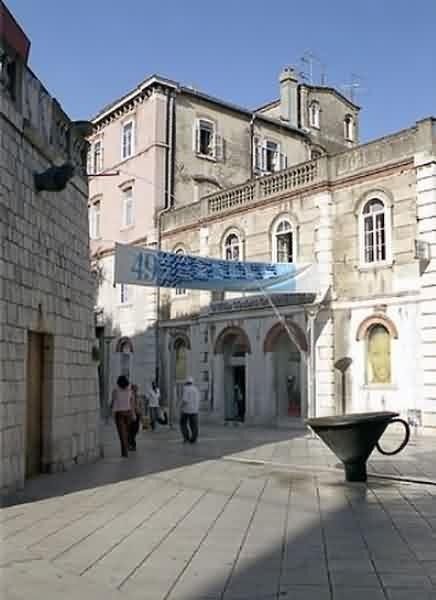
image by croatiaholidayshr.com
Below maps show that the šipak is facing Zagreb
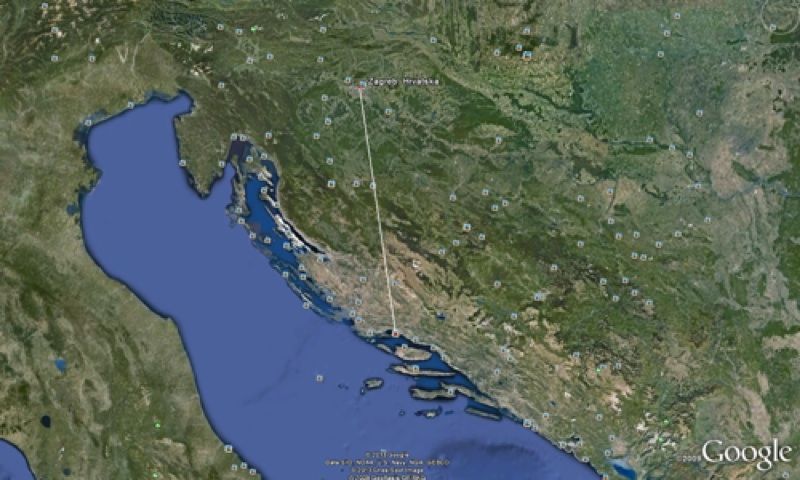
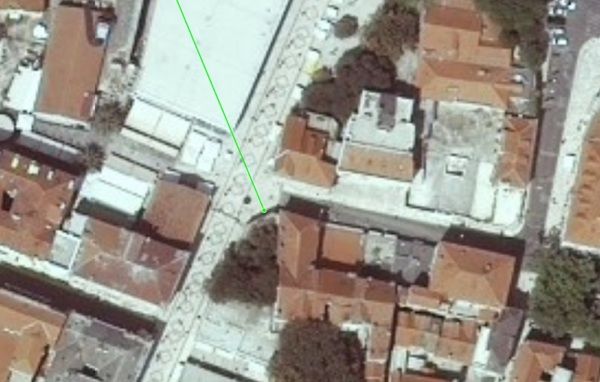
At the top of Marmontova is the square of Trg Gaje Bulata where you will find one of the best examples of modernist church architecture in “Gospe od Zdravlja” covering a still-preserved 17th century Franciscan monastery bell tower. Dominating the square is the bright Croatian National Theater of Split built in 1893, considered one of the biggest and oldest theater houses in the Mediterranean.
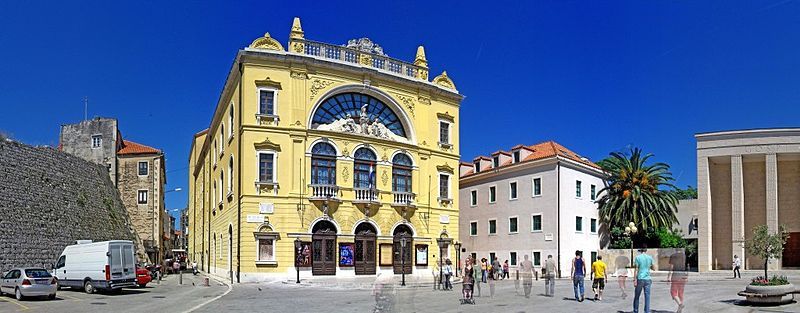
image by skyscrapercity.com
There are many branded shops along Marmontova, including Bershka, Paul&Shark, Tommy Hilfiger, Zara, Benetton, O'Neill, designer eyewear in Optika Anda and a full optical service in Salmoiraghi & Vigano.
Learning Dalmatian as a Non-Speaking Croat: Part 1
Me: “Can you help me take something out of my a***?”
Friend: “Are you normal?”
Me: “What? It’s not difficult. It won’t take a minute”
This is how one word changed the whole meaning of a conversation and I have been mocked about it ever since. What I meant was ‘storage room’ however, by adding just one letter to the word, it became a very inappropriate favor to ask for. Nonetheless, I continue to speak my pigeon Croatian without too many misunderstandings… I hope.
My Croatian mother who is fluent in Danish never taught me her language but despite that I have spent every single summer holiday in Croatia since my birth. With my Danish father towing along, all family and friends always spoke English to us. As I child I of course learnt the most important word of all, ‘sladoled’ meaning ice cream and I vividly remember fluttering my eyelashes at my cousin, Ana, signaling an ice-cream licking action and saying sladoled with enthusiasm five times per day.
They say that love grammar is the best way to learn a language so instead of cashing out on expensive language courses, I fell in love with a local who didn’t speak English. As first it was body language doing the talking but eventually our way of communicating resorted in him speaking Croatian and me, English. At least something positive came out of that relationship; I started understanding a wee bit of this complicated language.
A year ago, I didn’t dare to whisper a Croatian sound in fear of rejection but now I realize that the locals only appreciate my effort so I am feeling more confident with my Croatian gibberish. By mingling with local friends, my ears have been more exposed to the language and my natural curiosity has given me an understanding of mainly the Split dialect. Locals find it quite humorous to ear a so-called foreigner speaking in dialect. Given, my command of their seven cases is useless and I often speak to men in feminine form but I am getting the message across.
Essential words and phrases to get you by in Split dialect
A café latte with a glass of water on the side
Veliku stoplin mlikon i čašu(chasu) vode
Gimme a beer!
Daj (Die) pivo!
Do you want to come with me? Just the right pick-up line.
Očeš (Ochesh) ić (eech) smenon?
Thanks so much
Fala lipa
How much?
Pošto (poshto)?
Hey bro
Alo brale (bralé)
Where should we go?
Di ćemo?
I don’t understand
Ne razumin
A filling word when you have nothing wise to say
Ono
Any other Split dialect recommendations for visitors in Split?


